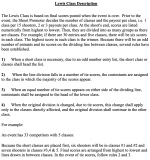I've noticed a few things that seem to make a match feel more welcoming, relaxed, and fun. Mostly it hinges on the people: Are we having a good time? Are we celebrating people's successes? Are we "in it together," even though we're competing?
There are other factors too of course: Impacts are super fun, so try to make sure most stages allow for plenty. Feel free to put a tiny target on most stages, but if you can get a shooter to hit over 60-70% of targets, that's pretty exciting and rewarding. "Rung what you brung" can be very discouraging depending on your kit so having a loaner rifle, or just sharing one that can be adjusted for different shooters quickly and repeatably, really lowers the barrier to entry.
Do you really feel like you're struggling to get midpack shooters to come back? Usually those are the folks that have decided it's a fun game and they're generally going to play when they don't have something else going on. I feel like the hardest people to keep coming back are those on a budget who come out, try it once with a rifle that really isn't appropriate, miss tons of targets, see a ton of pricey rigs, and get a lot of advice on all the crap they need to buy. Scheduling matches on accessible dates at accessible locations will improve midpack attendance, but getting a first-timer to leave and be thinking "Oh hell yes I'm doing this again" is a better barometer of how fun your match is in my opinion.
Other thoughts:
- Too many safety restrictions can be very intimidating, confusing, and stressful to a newcomer. There's really not much you can do about range rules, but try not to pile on if it's unnecessary. The four firearm rules of safety should honestly be good enough; the whole "The range has to be hot for you to get the rifle case out of your truck" thing is asinine.
- Long-range stages need big targets. If you want to have a weighted target array, that rewards people who gamble successfully on smaller targets, go for it, but zeroing a stage sucks, and there really isn't any good reason for it unless there's a catastrophic gear issue.
- Allow people to do reshoots if something went very wrong. We're here to shoot at targets; not shooting at targets cause you had a mag jam three times in a row just isn't fun.
- Let people game the props before the clock starts. Figure out their bipod heights, parallax, bag strategy, whatever. Most people don't dry-fire at home, and while we can assert "well that's on them," if your goal is to get people to come back, let them do their tinkering on the line.
- Consider setting up a mentor for a new shooter. A lot of times a newcomer will have a lot of advice thrown at them from everyone on the squad, and let's be honest, this game is pretty complicated. Designate one experienced shooter that day to take the new person under their wing, and try to keep the firehose to a drinkable pace.
I dunno man, it seems like you're trying to make a match for everyone. You want midpack shooters to be more separated in score, come back, and maybe bring a first-timer friend. You also want to entice "podium capable shooters," and experienced hunters for the first time also? That's a lot going on in your objectives list. If you're trying to appeal to everyone, focus on making it more fun than competitive. Everyone seems to love the Guardian matches, I'll shoot my first one this year cause I haven't heard a bad thing said about them yet. Those are very much about collaboration, fun, and a good cause; nobody is cranky about some RO/MD decision that affected a score by one shot and cost somebody some place or other.
As for things that are stale: I'm pretty over shooting off of utterly inappropriate rope crap. Rope ladder, rain chain, whatever it is. I wouldn't take the shot at a rabbit off that prop, I'd use a tripod, fence post, or just walk my butt a little closer. Just my two cents.


